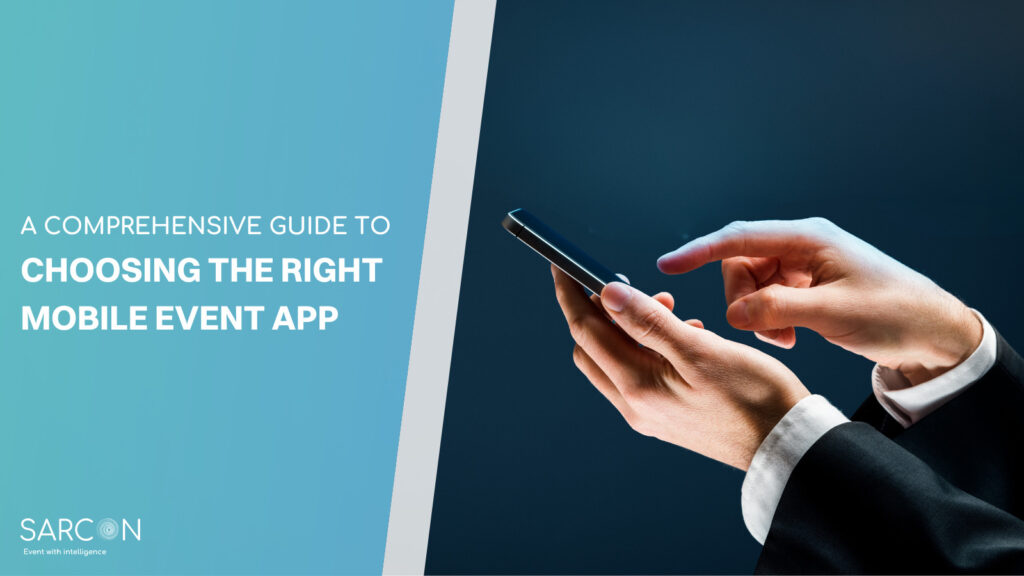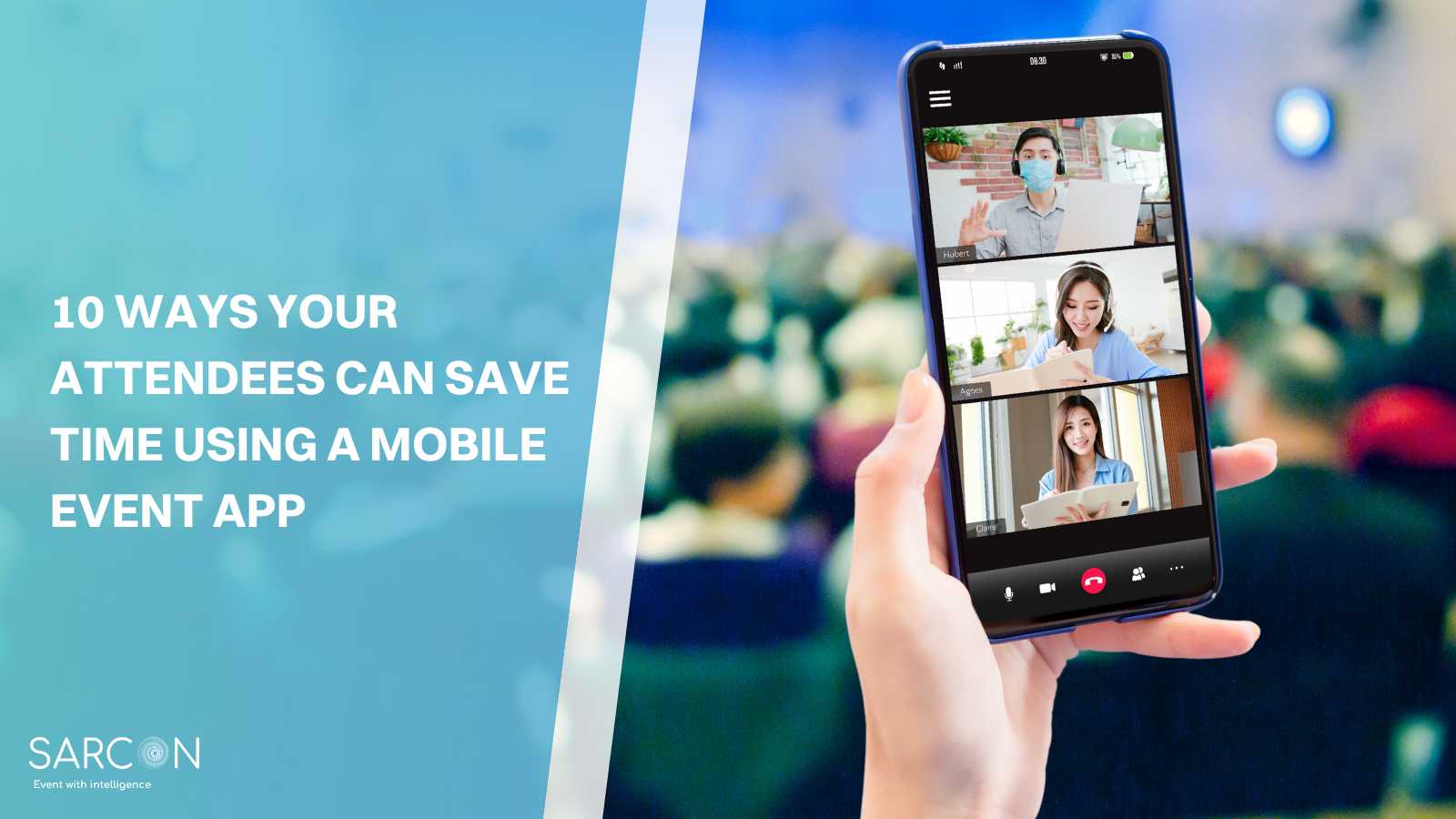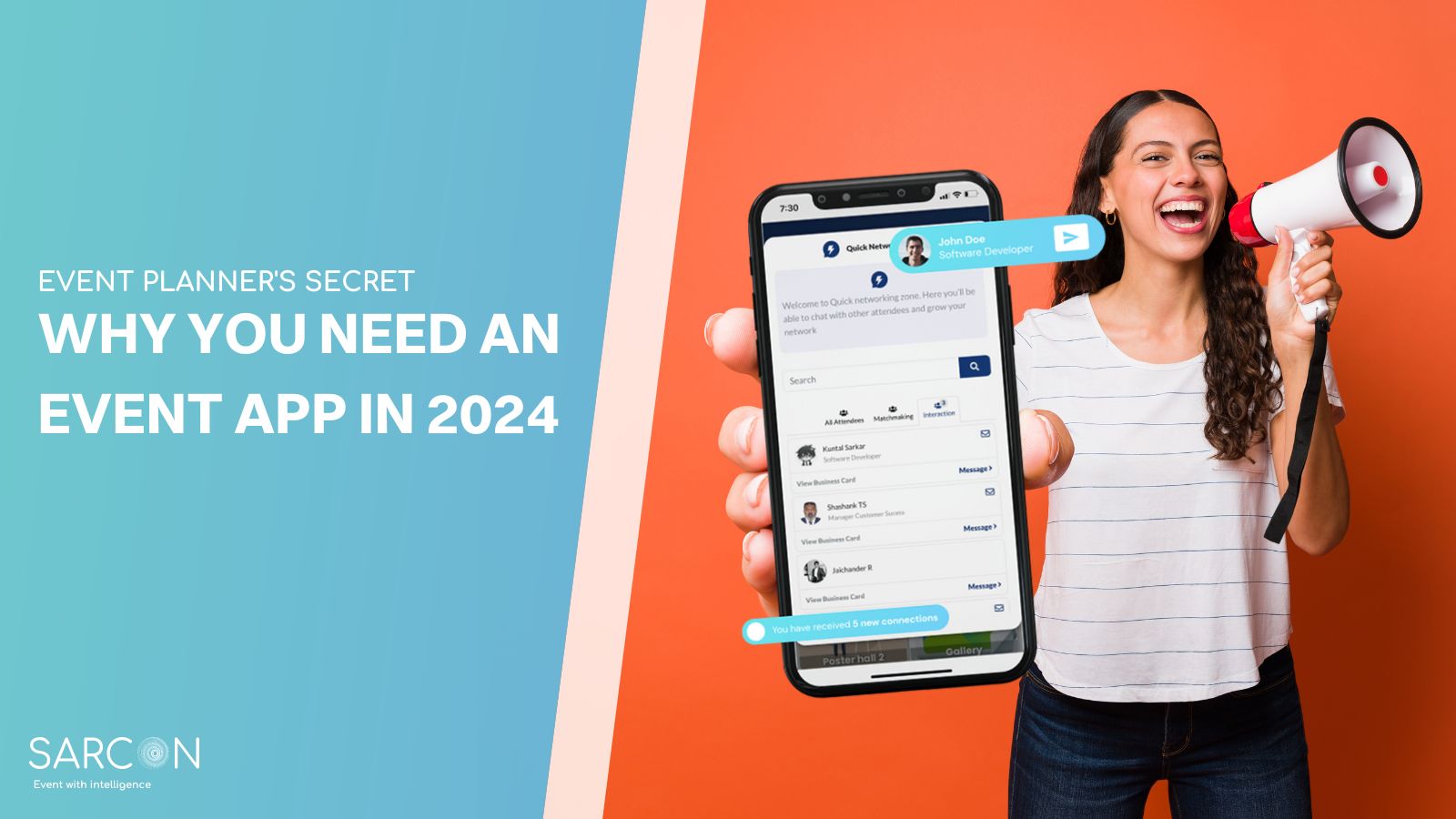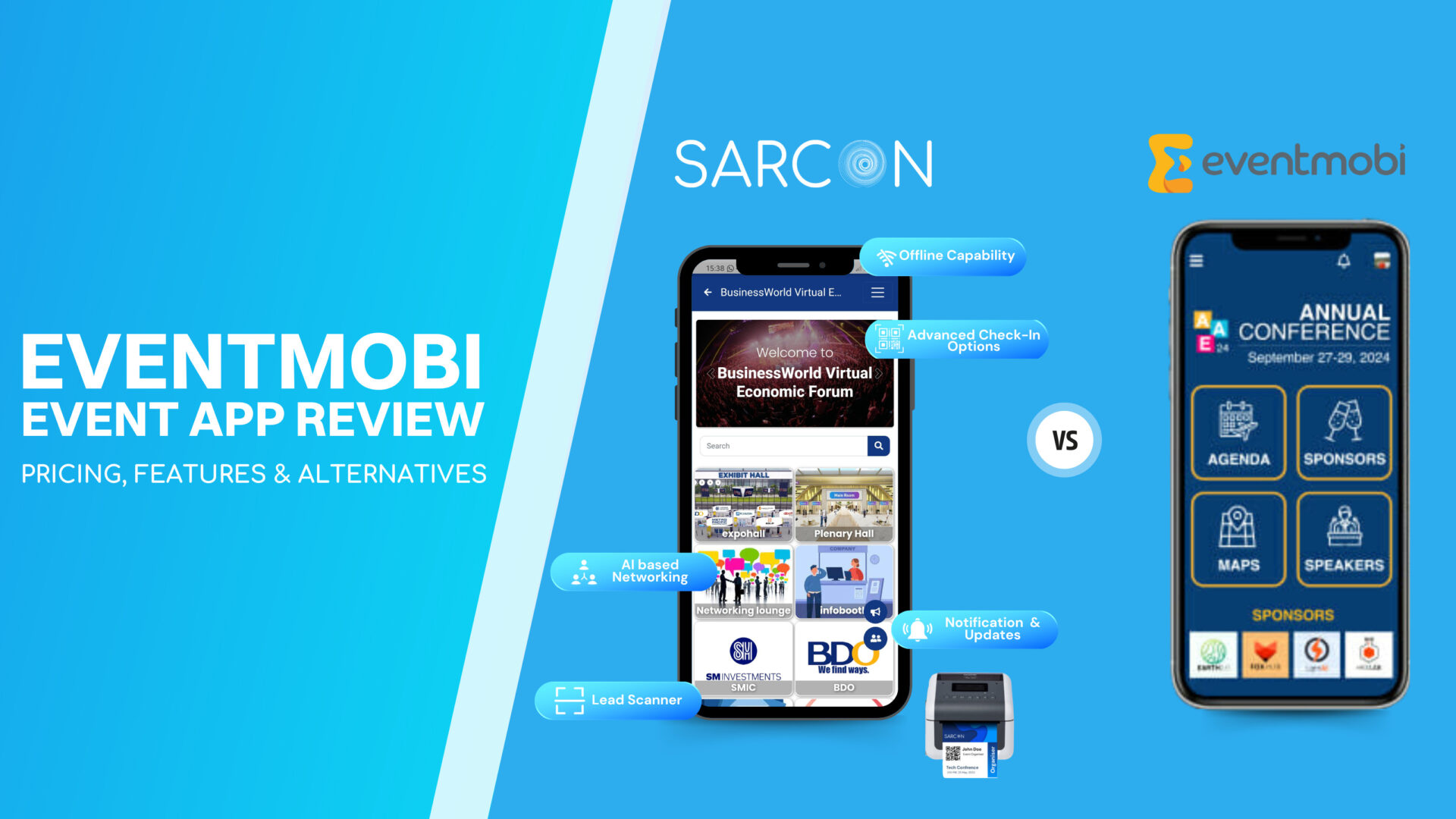Navigating the dynamic landscape of modern events has never been more challenging or exciting. As event organizers and attendees alike embrace the digital age, mobile event apps have emerged as indispensable tools, revolutionizing the way we plan, manage, and experience gatherings of all kinds. However, the growing popularity of mobile event apps also means an increasingly crowded marketplace. With an array of options available, choosing the right app for your event can be a daunting task. The decision is not to be taken lightly, as the success of your event can significantly hinge on the choice you make.
In this comprehensive guide, we’ll explore the multifaceted world of mobile event apps, helping you make informed decisions that will enhance your event planning and attendance experience. So, let’s dive into the intricacies of selecting the perfect mobile event app for your specific needs and objectives.
1. Define Your Objectives
Before you start searching for a mobile event app, it’s essential to define your objectives clearly. Your objectives serve as the foundation for selecting the right app because they dictate the features and functionalities you need. Some common objectives include:
- Attendee Engagement: If your primary goal is to increase attendee engagement, look for features like networking tools, live polls, and interactive activities within the app.
- Content Delivery: If your event revolves around sharing information and content, you’ll need features like session schedules, speaker bios, and presentation materials.
- Event Management: For streamlining event management, focus on features like attendee check-ins, real-time updates, and analytics for tracking event performance.
- Sponsorship Visibility: If you aim to boost sponsor visibility, consider apps that allow sponsor branding, push notifications for sponsor activities, and sponsorship tracking features.
2. Features and Functionality
Once you’ve outlined your objectives, you can narrow down the specific features and functionalities your event app should have. Here’s a more detailed breakdown of common event app features:
- Agenda Management: A robust event app should offer comprehensive agenda management capabilities. This includes the ability to create and manage event schedules, sessions, and speaker information. Attendees should be able to view session details, access speaker bios, and customize their own schedules based on their interests.
- Networking Tools: Effective networking tools are essential for facilitating attendee-to-attendee interaction. The app should provide features like attendee profiles with relevant information, a messaging system for communication, and the option to schedule one-on-one or group meetings. Additionally, in-app social feeds can encourage discussions and connections among attendees.
- Live Polls and Surveys: Real-time interaction is key to keeping attendees engaged. Look for an app that enables the creation of live polls and surveys. These tools can be used to gather feedback, conduct Q&A sessions during presentations, and gauge audience sentiment on various topics.
- Interactive Maps: For events taking place at physical venues, interactive maps are indispensable. The app should include venue maps that help attendees navigate the event space. This can include the layout of session rooms, exhibitor booth locations, restrooms, and other important points of interest.
- Gamification :When choosing a mobile event app, look for those that offer gamification features. These can include points systems, leaderboards, challenges, and rewards. Gamification adds an element of competition and fun to your event, motivating attendees to participate actively. For more info read :How you can use Mobile Event App to Gamify your Events
- Push Notifications: Timely communication is crucial. Push notifications allow organizers to send instant updates and announcements to attendees. Whether it’s a schedule change, a reminder of an upcoming session, or an important announcement, push notifications keep attendees informed and engaged.
- Analytics: Data is invaluable for post-event analysis and decision-making. The app should offer analytical tools that allow you to collect and interpret data on attendee interactions, preferences, and behaviors. This data can provide insights for future events and help fine-tune your strategies.
- Integration: Consider how well the app integrates with other event-related technologies. It should seamlessly connect with registration systems, ticketing platforms, and customer relationship management (CRM) software.Furthermore, check if the app supports integrations with third-party services that you plan to use during your event, such as polling tools, audience response systems, or live streaming platforms. Integration ensures a smoother experience for both organizers and attendees.
Choosing an app with the right combination of these features is critical to meeting your event’s specific needs.
3. User Experience (UX) and Interface
The user experience (UX) and interface of the app significantly impact attendee engagement. Here’s a closer look at what to consider:
- User-Friendly Design: The app should have a clean and intuitive design that makes navigation straightforward. Attendees should be able to find information and access features without confusion.
- Cross-Platform Compatibility: Ensure that the app is compatible with both iOS and Android devices. It’s also essential that the app functions well on various screen sizes, from smartphones to tablets.
- Accessibility: The app should be designed with accessibility in mind, accommodating attendees with disabilities. Features like adjustable font sizes and screen reader compatibility are beneficial.
- Offline Access: Events often experience issues with internet connectivity and having an app with offline capabilities like Sarcon can be quite beneficial. Opt for mobile event app that provides offline access to essential information, such as schedules, speaker bios, and maps. This ensures attendees can access crucial details even without a reliable internet connection.
4. Customization and Branding
Customization and branding are vital for creating a consistent and memorable event experience. Look for an app that offers the following customization options:
- Branding Elements: The app should provide options to incorporate your organization’s branding elements seamlessly. This includes the ability to add your logo, color schemes, and event-specific themes. A well-branded app enhances recognition and reinforces your event’s identity. For more info read : Event Branding Guide 2023: Everything You Need to Know
- Content Customization: Your event app should allow you to customize content such as session descriptions, speaker bios, and sponsor information. This customization ensures that the app aligns with your event’s specific content needs.
- Custom Features: Some apps allow you to add unique features or interactive elements that align with your event’s theme and goals.
- Templates and Themes: The app should provide templates and themes that make it easy to align the app with your event’s theme or design. Pre-designed templates can save time and effort while ensuring a professional and coherent look.
- Responsive Design: Ensure that the app’s customization features are designed to be responsive and compatible with various devices and screen sizes. This ensures a consistent look and feel across smartphones, tablets, and web browsers.
Customization ensures that the app aligns with your event’s identity and resonates with attendees.
5. Registration and Ticketing
The registration and ticketing process is a fundamental component of event planning, and the mobile event app you select should streamline and enhance this critical aspect. Here’s what to consider:
- Online Registration: A robust mobile event app should support online registration, allowing attendees to sign up, purchase tickets, and complete the registration process seamlessly within the app. It should provide a user-friendly registration interface that guides attendees through the process.
- Ticket Sales: The app should facilitate ticket sales, including options for different ticket types, pricing tiers, and discounts if applicable. Ensure it can handle both free and paid events, and accommodate various payment methods for ticket purchases. For more info read :20 Effective Tactics to Sell More Event Tickets
- Custom Registration Forms: The app should enable you to create custom registration pages and forms to collect attendee information relevant to your event. This may include contact details, dietary preferences, and more. Customizable forms ensure you gather the data you need.
- Check-In and Badge Printing: A comprehensive mobile event app should offer check-in and badge printing functionality. Attendees can use the app to check in at the event, and organizers can print event badges for on-site registration, enhancing the efficiency of the check-in process.
- Access Control: Look for features that allow you to manage access control and permissions through the app. This can include scanning QR codes on attendee tickets for entry, ensuring that only registered attendees gain access to sessions and activities.
- Real-Time Reporting: The app should offer real-time reporting on registration and ticketing metrics, allowing you to monitor ticket sales, registration numbers, and revenue in real-time. Access to this data is invaluable for making informed decisions during the event.
- Promotion and Marketing: Some event apps like Sarcon come with marketing features, such as WhatsApp and SMS marketing, email marketing and social media integration, to promote your event and encourage ticket sales.
- Support for Complex Events: If your event involves complex ticketing structures, such as multi-track sessions, VIP packages, or add-ons, confirm that the app can accommodate these intricacies.
For more info read :The Dos and Don’ts of Event Registration: Best Practices for a Successful Event
6. Scalability and Compatibility
To accommodate events of various sizes and types, consider the app’s scalability and compatibility:
- Scalability: Ensure that the app can handle events of different scales, from small meetings to large conferences. It should adapt to your event’s growth.
- User Accounts and Attendee Management: The app should handle the management of attendee accounts efficiently, regardless of the event size. This includes attendee registration, user profiles, and data management.
- Multi-Event Support: If you manage multiple events throughout the year, consider an app that supports multiple events within a single platform. This streamlines the process and allows you to maintain consistent branding and features across your event portfolio.
- Cross-Platform Compatibility: The app must be compatible with various operating systems, including iOS and Android. This ensures that a broader audience can access and benefit from the app, regardless of their preferred mobile device.
- Device Compatibility: The app should work on a variety of devices, including smartphones, tablets, and even web browsers. This ensures that attendees can access it regardless of their preferred technology.
7. Security and Data Privacy
Protecting attendee data and ensuring privacy are paramount. Look for an app that prioritizes security and data privacy through the following measures:
- Data Encryption: The app should employ robust data encryption methods to secure information in transit and at rest. Look for apps that use SSL/TLS protocols to protect data transfers.
- Secure Login Procedures: Consider opting for mobile event apps that offer robust authentication methods, like two-factor authentication. This prevents unauthorized access and enhances the security of attendee profiles.
- Data Privacy Policy:The app provider should have a clear and comprehensive data privacy policy in place. This policy should explain how they handle attendee data, who has access to it, and the purposes for which it’s used.
- Compliance with Regulations: Ensure that the app provider complies with relevant data privacy regulations, such as GDPR (General Data Protection Regulation), CCPA or other industry-specific requirements. Request documentation of their compliance and security practices.
- Access Control: Verify that the app offers access control features, such as role-based permissions. This ensures that only authorized users can access sensitive data and features.
8. Support and Reliability
Reliable customer support is crucial in case you encounter issues or have questions. Here’s what to consider:
- Customer Support Availability: Ensure that the app provider offers responsive customer support. The availability of a support team during your event is crucial. This includes support availability through email, phone, and live chat. Verify their response times and support hours to align with your event schedule, especially if it spans different time zones.
- User Support Resources: Check if the app provider offers a knowledge base, FAQs, user guides, or video tutorials. These resources can be invaluable for both your event planning team and attendees in navigating the app and troubleshooting common issues.
- Training and Onboarding: Evaluate the availability of training and onboarding support. The app provider may offer webinars, training sessions, or personalized onboarding assistance to ensure you and your team are well-prepared to use the app effectively.
- Uptime and Reliability: Reliability is paramount. Research the app provider’s historical uptime and performance. An app that experiences frequent downtime or performance issues can negatively impact your event. Ask for references or case studies to confirm the app’s reliability.
9. Cost and Budget Consideration
Understanding the cost of the app and how it fits into your budget is essential. Consider the following factors:
- Pricing Structure: Different apps have varying pricing structures, such as one-time fees, subscription models, or per-event pricing. Choose the one that aligns with your budget and event frequency.
- Hidden Costs: Be aware of any hidden costs, such as fees for additional features or support services. Ensure you have a clear understanding of the total cost.
- ROI Analysis: Consider the potential return on investment (ROI) the app can deliver. Will the benefits it provides outweigh the costs?
10. Test and Trial
Before committing to an app, take advantage of any trial or demo offerings:
- Hands-On Experience: Testing the app allows you to experience it firsthand, helping you assess its usability and functionality.
- User Feedback: Encourage potential users, such as your event planning team or select attendees, to participate in the trial and provide feedback.
- Feature Evaluation: During the trial, evaluate how well the app meets your event’s specific needs and objectives.
11. Reviews and Recommendations
Research and feedback from other event organizers and attendees can be invaluable:
- Online Reviews: Look for online reviews and testimonials from those who have used the app for similar events. Pay attention to both positive and negative feedback.
- Recommendations: Seek recommendations from industry peers and colleagues who have experience with event apps. They may offer insights and suggestions based on their experiences.
12. Types of Contracts and Agreements
Event planning involves various contracts and agreements. Here are the common types:
- Terms of Service: Review the app provider’s terms of service or user agreement. This document outlines the legal terms and conditions governing the use of the app. Ensure that it aligns with your event’s needs and policies.
- Pricing and Payment Terms: Examine the pricing structure and payment terms in the contract. Understand the payment schedule, any potential discounts, and whether the pricing is fixed or variable based on event size.
- Cancellation and Refund Policies: Familiarize yourself with the cancellation and refund policies in case you need to cancel or postpone your event. Knowing the associated costs and deadlines is crucial.
- Data Ownership and Usage: Determine the ownership of data collected through the app. Clarify how the provider uses attendee data and whether they retain any rights to it. Ensure compliance with data privacy regulations.
- Support and Maintenance: Clarify the level of support and maintenance you’ll receive. Understand response times for support requests and the scope of maintenance services provided.
By thoroughly considering each of these points, you’ll be well-prepared to select the right mobile event app that aligns with your event’s goals and delivers a seamless, engaging experience for all attendees.
FAQs
What is a mobile event app, and why do I need one for my event?
A mobile event app is a software application designed to enhance the attendee experience at events. It provides valuable information, networking opportunities, and interactive features to make your event more engaging and organized. You need one to streamline event management, engage attendees, and keep them informed. For more info read : The Ultimate Guide to Mobile Event App
What’s the most critical feature for an event app?
The most critical feature is having a comprehensive event schedule and agenda, as it provides attendees with a clear overview of the event’s activities and sessions.
Can I customize the app to match my event’s branding?
Many mobile event apps allow for branding customization, including logos, colors, and themes, to align with your event’s identity.
How do I assess the scalability of a mobile event app for large events?
Ensure the app can handle a high volume of users, concurrent sessions, and data. Ask the provider about their experience with large events and request case studies or references to confirm scalability.
Can you recommend some popular mobile event app providers or platforms?
Some popular options include Sarcon, Webex Events App etc. However, the best choice depends on your event’s specific needs, so be sure to evaluate them based on your requirements.



